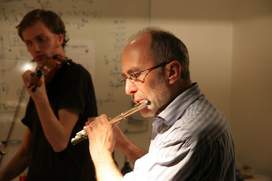Even the best musicians do not play rhythms with perfect precision.
Slight deviations from an ideal beat pattern are a fundamental
characteristic of music played by humans. In this public lecture, using
techniques from statistical physics and chaos theory, Prof. Geisel will
discuss the laws underlying rhythmic fluctuations and their role in
musical perception. With acoustic demonstrations and musical examples
ranging from J.S. Bach's The Art of Fugue to stochastic music, he will
highlight the role of long-range correlations in music and its
connection to information processing in the brain. One application of
these findings is a "humanizing algorithm" which allows
computer-performed music to sound more human.

To download: Right-click and choose "Save Link As..." (Other video options)

